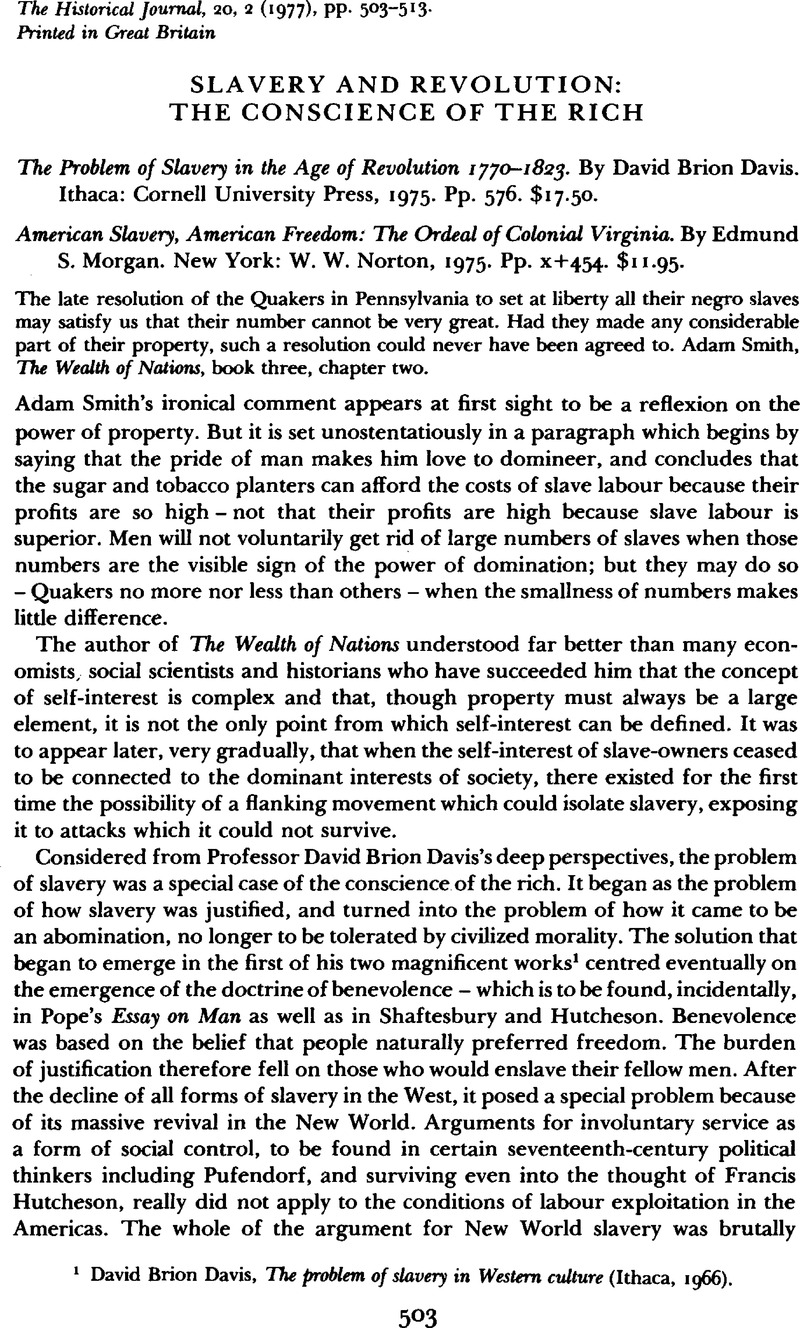Article contents
Slavery and Revolution: the Conscience of the Rich
Published online by Cambridge University Press: 11 February 2009
Abstract

- Type
- Review Articles
- Information
- Copyright
- Copyright © Cambridge University Press 1977
References
1 Davis, David Brion, The problem of slavery in Western culture (Ithaca, 1966)Google Scholar.
2 Howell, T. B., State trials (London, 1814), xx, 2–82; p. 82Google Scholar.
3 Blackstone warned Granville Sharp not to rely on the more outright version in the first edition, which declared that English law freed a slave who set foot in England. Davis, Age of revolution, p. 485Google Scholar.
4 I am grateful to Dr David Yale for a letter on the interpretation of Somerset and related cases. It is clear that even in the light of Somerset, residence in England did not make a slave free if that slave left British shores without compulsion; and yet a master, though entided by law to the slave's service, could not compel the person. The contradiction (it seems to me) was inherent in the condition, and no logical resolution was possible. Lord Stowell avowed himself an abolitionist; another anti-slavery judge, Joseph Story of the United States Supreme Court, regretfully accepted his opinion as binding precedent for American law. I would like also to record my sense of indebtedness to the late Jacob Viner of Princeton University, who in the course of a long conversation in 1957 pointed out to me that James Somerset was the only slave freed by Lord Mansfield's famous decision and that both slavery and slave sales continued in Britain.
5 Anstey, Roger, The Atlantic slave trade and British abolition, 1760–1810 (London, 1975), pp. 406–7CrossRefGoogle Scholar. In his analysis of the tactics by which Grenville and the abolitionists urged the importance of cutting off the slave trade to captured foreign islands as a precaution against enhancing their value against their possible return at the end of the war, Anstey observes in a brilliant aside which has some bearing on Davis's thesis, that the situation is ‘perhaps harder to discern because one is so conditioned to expect interest to masquerade as altruism that one may dismiss altruism when concealed beneath the cloak of interest’. Ibid, pp. 407–8.
6 Anstey, , Atlantic slave trade, p. 285Google Scholar.
7 Jordan, Winthrop D., White over black: American Attitudes toward the Negro, 1550–1812 (Chapel Hill, 1968)Google Scholar.
8 Freehling, William, ‘The Founding Fathers and slavery’, American Historical Review, LXXVII (February 1972)Google Scholar.
9 Morgan, Edmund S., ‘Slavery and freedom: the American paradox’, Journal of American History, LIX (June 1972)Google Scholar.
10 Bailyn, Bernard, ‘Politics and social structure in Virginia’ in Smith, James Morton, ed., Seventeenth century America (Chapel Hill, 1959)Google Scholar.
11 Jordan, , White over black, pp. 44–98Google Scholar.
12 Tocqueville, Alexis de, De la dJmocratie en Amerique (ed. Meyer, J.-P., Paris, 1961), I, 357Google Scholar. These views are I think close to Jordan's concept of the ‘unthinking decision’ to institute racial slavery. Morgan consistently underrates the cumulative weight of Jordan's evidence for the sixteenth and seventeenth centuries.
13 Pole, J. R., Political representation in England and the origins of the American Republic (London, 1966), pp. 533–4CrossRefGoogle Scholar.
- 1
- Cited by


